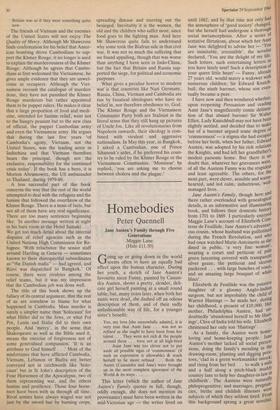Homebodies
Peter Quennell
Jane Austen's Family through Five Generations Maggie Lane (Hale £11.50) Going up or going down in the world seems often to haVe an equally bad effect upon the human character. During her youth, a sketch of Jane Austen's favourite niece Fanny, painted by Cassan- dra Austen, shows a pretty, slender, deli- cate girl herself painting at a small round table; but, many years later, when both her aunts were dead, she dashed off an odious description of them, and of their sadly unfashionable way of life, for a younger sister's benefit: Yes, my love [she sorrowfully admits], it is very true that Aunt Jane . . . was not so refined as she ought to have been from her talent . . . They were not rich & the people around them . . were not at all high-bred . . . Aunt Jane was too clever not to put aside all possible signs of 'commonness' (if such an expression is allowable) & teach herself to be more refined . . . Both the Aunts (Cassandra and Jane) were brought up in the most complete ignorance of the World & its ways . . .
This letter (which the author of Jane Austen's Family quotes in full, though, oddly enough, she does not mention its provenance) must have been written in the mid-Victorian age — the writer lived on until 1882; and by that time not only had the atmosphere of 'good society' changed, but she herself had undergone a thorough social metamorphosis. After a series of tentative flirtations, about which her Aunt Jane was delighted to advise her — ,You are inimitable, irresistible', the novelist declared, 'You are the delight of my life. Such letters, such entertaining letters as you have lately sent! Such a description of your queer little heart' — Fanny, already 27 years old, would marry a widower with numerous children, Sir Edward Knatch- bull, the ninth baronet, whose son even- tually became a peer. I have now and then wondered whether, upon reopening Persuasion and reading Aunt Jane's magnificently comic delinea- tion of that absurd baronet Sir Walter Elliot, Lady Knatchbull may not have been slightly nettled, and decided that to make fun of a baronet argued some degree of 'commonness' — a stigma she had escaped before her birth, when her father, Edward Austen, was adopted by his rich relations the Knights, and had left her grandfather's modest parsonic home. But there is no doubt that, whatever her grievances were, of all the Austens Fanny was the stupidest and least agreeable. The others, for the most part, were clever, sensible and warm- hearted, and led calm, industrious, well' managed lives. Jane Austen's Family, though here and there rather overloaded with genealogical details, is an informative and illuminating book, and follows their domestic history from 1701 to 1869. I particularly enjoyed Maggie Lane's account of Elizabeth Com- tesse de Feuillide, Jane Austen's adventur- ous cousin, whose husband was guillotined during the French Revolution, and who had once watched Marie-Antoinette as she dined in public, 'a very fine woman , wearing a corset and petticoat of Pale green lutestring covered with transparent silver gauze, the petticoat and sleeves puckered . . . with large bunches of roses, and an amazing large bouquet of white lilacs'.
Elizabeth de Feuillide was the putative daughter of a gloomy Anglo-Indian surgeon, but not improbably the child. of Warren Hastings — he made her, during her childhood, a present of £10,000. Her mother, Philadelphia Austen, had un- doubtedly 'abandoned herself to Mr Hast- ings', Clive of India told his wife. Elizabeth christened her only son 'Hastings'. As a family, the Austen were home" loving and home-keeping people. Jane Austen's mother lacked all social preten- sions, doing the family's mending in the drawing-room, planting and digging pota- toes, 'clad in a green workmanlike smock; and rising from her bed . . . to walk a Mile and a half along a pitch-black muddy country lane to help her daughter-in-law in childbirth'. The Austens were naturallY philoprogenitive; and marriages, pregnan- cies, births and childish illnesses were subjects of which they seldom tired. From this background sprang a great novelist.














































 Previous page
Previous page